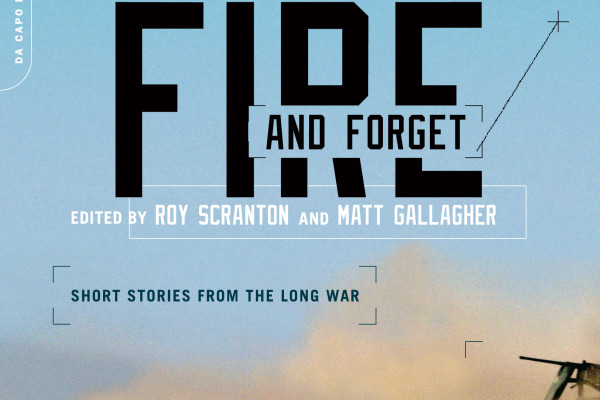Review by Elisabeth Sherman
The narrator of Mariette Kalinowski’s story “The Train,” in the book Fire and Forget, a collection of stories written by veterans and their families, claims that “the compulsion of gravity” is the “single most powerful law of the universe.” A common misconception. In particle physics, the appropriately named Strong Force is the strongest force is nature. It binds protons and neutrons together to form the nucleus of an atom. This is the essential problem of this short story collection–what’s said in these pages fails to ring true upon inspection, though at first look the stories seem real enough.
“Truth,” the editors of Fire and Forget, Matt Gallagher and Roy Scranton, write in the book’s preface, “comes up something for grabs. Well, here’s some. Grab it. We were there. This is what we saw. This is how it felt. And we’re here to say it’s not like you heard in the stories.” A strange declaration given that this is a book of stories after all, and the only way to get at the truth of an experience is through storytelling, as the likes of Tim O’Brien, Erich Maria Remarque, and Joseph Heller can attest to in their formative works on the war. If this is another attempt to get that elusive element of truth in what is like to be soldier and a veteran, then it doesn’t completely fail. There are moments of truth in these stories: In Colby Buzzell’s “Play the Game,” the author details the experience of a soldier who returns home to live in a hotel, gets a job waving a sign on street corner, and ends up so drunk that he blacks out, forgets where he parked his car and reports it stolen. Or in Andrew Slater’s “New Me,” which tells the story of a soldier discharged from Walter Reed who relives his anxieties in his dreams while in his waking life he tries to reintegrate into civilian life through a girlfriend who can’t be bothered to assist in his recovery.
But then again perhaps this isn’t an attempt to get at any kind of essential truth about war. Perhaps it’s just an expression of the emotions and experiences these veterans associate with their time at war, overseas and at home. I couldn’t be sure what the point was. Here’s what I learned from this book: it’s really hard go back to your girlfriend after you’ve been to war, and that soldiers really like to swear and use military slang and fuck with each other. But didn’t I already know that? I mean, I’ve seen Band of Brothers. And maybe that’s alright. What I was reading was, the albeit fictionalized, version of the experiences of these soldiers. It’s difficult to accuse an experience of being cliché when it actually happened. Except that nothing in this book did actually happen, if we’re going with the conceit that fiction is not fact. That the book makes no attempt to avoid cliché is incredibly troubling.
In the story “Tips for a Smooth Transition” by Siobhan Fallon, for instance, an army wife struggles with the behavior of her husband who has just returned home from Iraq. He displays the controlling, risk-taking behavior typical of him as a person and as a soldier. The narrator at one point relates to the reader that one of the tips she received in counseling for loved ones of returning soldiers, is that if they have nightmares don’t stay in bed with him or her for safety reasons. You could be mistaken for an enemy combatant. At the end of the story, the narrator chooses to get back in bed with her husband as he writhes in bed, and holds him through the episode, safety be damned! Because it’s her duty as a military wife to risk her life to stay true to her man, I assume, despite the fact that he mistreats her, by her own admission, throughout the whole story. If this was Fallon’s experience with her husband after he returned home from Iraq, that’s legitimate of course, but there’s no nuance, no attempt to illustrate the struggle of consciousness that women must go through when their husbands leave them for war zones. Instead, the narrator spends her vacation feeling guilty for kissing another man while her husband was deployed — without addressing that it is okay to feel abandoned and lonely and worthless when you’re husband leaves you and just as okay to love him all the same.
The book begins to feel formulaic by the seventh or eighth story in. In “Raid” by Ted Janis, we know that the character Doc knows all the military jargon– “community,” “re-up,” “Objective Charon 7,” “HLZ”— that his sergeant won’t get off his back, that he cracks jokes with his translator about murder. That’s who he is as a soldier. But who is he as a person? I have no idea. If the idea is that the military erases individuality, the reader would have to fill in the gaps because that theme is never introduced by the author. Similarly in “Television” by Roman Skaskiw, there is one soldier who a trigger-happy, borderline racist loud mouth and his superior— reserved, dutiful and polite, if not a little skeptical about his job. They are cardboard cutouts of characters, the stereotype that doesn’t dare break the mold. I felt as though each character existed within the two dimensions of the story, that their narrative was constructed and conceived to exist within these pages only, and couldn’t transcend , or even acknowledge, the clichés they were perpetuating on the page.
I understand the problem here: is it really cliché if this is what these people experienced? And it’s a good question. But for that issue to manifest itself here, that question of what is true and what is imagined, what is myth and what is reality, then the authors would have to convince me that what I think is a cliché is a really an essential truth about the nature of war, that what I perceived to be a stereotype is the honest expression of their experience. Instead, I felt cheated. Even lied to. Because I want the truth—and even if it is impossible to get at, I expect those who have lived it and feel it is their duty impart compassion and understanding on their reading public, to make their best effort to deliver it.
Elisabeth Sherman is currently pursuing an M.F.A. in creative nonfiction at Columbia University’s School of the Arts. She has been published on Not So Popular and on Tor.com.




